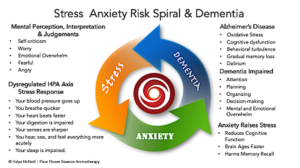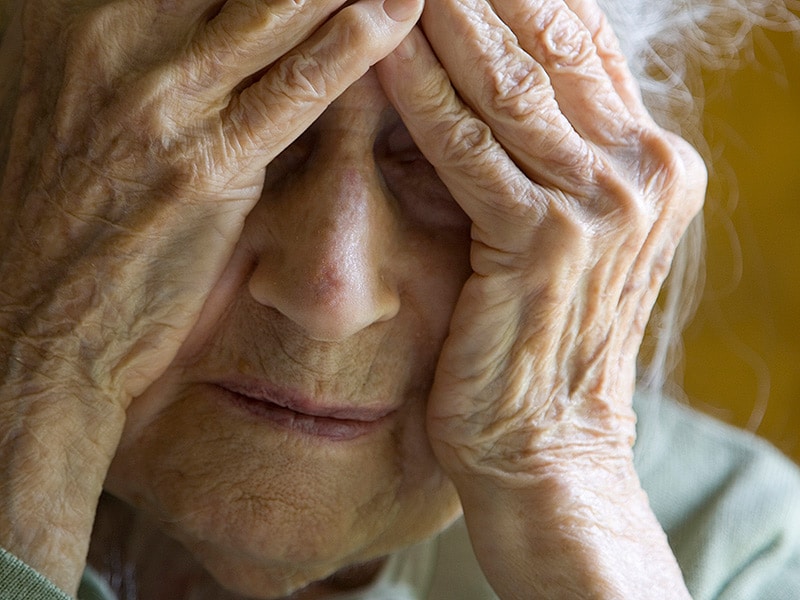“You cannot do a kindness too soon, for you never know how soon it will be too late.” –Ralph Waldo Emerson
World Kindness Day is celebrated on November 13 each year. This day promotes the awareness of the importance of being kind to each other, to yourself, and to our elders.
The purpose of this day is to help everyone understand that compassion for others is what binds us all together. This understanding has the power to bridge the gap between ourselves and those who are suffering, infirmed, or struggling for any reason.
When someone is living with dementia, they can feel disconnected from their community because of the stigma attached to the disease. Being diagnosed with dementia like Alzheimer’s can obviously create a lot of stress, but did you know chronic anxiety can also be a contributing cause of dementia?
Dementia doesn’t come out of anywhere. It’s a consequence of multiple causes that tends to appear later in life. Recently, researchers have discovered some fascinating and startling connections regarding how the disease spreads through the brain and how it may begin.
The Cycle of Stress and Anxiety
Health providers know that there is a link between long-term exposure to stress and both physical and mental health problems. Anxiety triggers an excessive stress response. 
In the early stages of dementia, people often experience high levels of stress and anxiety as they worry about their memory and the future. People at this stage who still have a good understanding and awareness of their condition are more likely to experience anxiety.
Anxiety has been recognized as one of the potentially modifiable dementia risk factors. Research suggests chronic stress and anxiety can damage areas of the brain involved in emotional responses, thinking, and memory, especially in midlife.
My Mother’s Descent into Dementia
Several years before my mother was diagnosed with Alzheimer’s disease, when she noticed her mental abilities were deteriorating, my mother told me she was becoming more forgetful. In fact, she became more fretful and anxious as a result of misplacing important items (like her car keys and wallet) and being unable to go back over her steps to find them again.
My mother’s condition was exacerbated by her anxiety, especially symptoms that affected her ability to pay attention, plan, organize, and think clearly. Living alone, the difficulty she was having keeping track of monthly bills and managing her finances caused her to trust people who took advantage of her. This resulted in her making poor decisions that eventually, over time, endangered her ability to care for herself.
As she revealed how scatter-brained, confused, and fearful she was becoming, I understood how vulnerable she felt knowing that her greatest fear had come to pass. She desperately wanted to retain control of her mind and keep her independence.
Stressful Life Events
One of the dementia triggers may be something most of us experience: Stressful Life Events.
You see, my grandmother, my mother’s mother, suffered from cognitive loss due to a stroke in her elder years when my mother was in midlife, and I was a teenager. My mother was her primary caregiver spending days away from our home to care for her.
During that stressful time caring for my grandmother, my mother often told me how afraid she was of losing her mind and becoming a burden on others – like her mother.
Taking care of her mother (and eventually her father) was one of the most stressful life events she experienced. Although goodhearted in her love and care, this event was a strain on her emotionally affecting her levels of stress increasing her anxiety about her own future.
Through the holistic perspective, we know stress unabated can trigger a degenerative process – body and or mind. Repeated or prolonged stress may be a determining factor in mental degeneration in older people with genetic, biological, or psychological vulnerabilities to dementia. An individual’s personality, coping abilities, and the support they have will determine the impact of life events such as these.
Psychological symptoms experienced by dementia patients who are experiencing anxiety may also experience depression and apathy. Along with feeling anxious, they may also feel tired, uneasy, and irritable.
A person with dementia who also suffers from anxiety may also show changes in their behavior, such as being agitated, restless, or may display hoarding. Some people may constantly seek reassurance and don’t want to be left alone.
Others become increasingly isolated because they feel overwhelmed taking care of the basics. In social situations, some people, like my mother, find it difficult to converse as they become increasingly confused. It’s common for people living with Alzheimer’s to have trouble following or joining a conversation.
Reducing Dementia Risks
Considering that stress and anxiety is a common yet treatable condition among older adults, their treatment and prevention might help reduce the incidence and prevalence of dementia, as well as its personal, family, and social burden.
The key to aging well in life is managing your stress well, well before your elder years. If you notice you are becoming anxious due to your levels of stress, reach out and speak to someone about your experience.
Nonpharmacological therapies, including talking therapies, mindfulness-based interventions, meditation practices, and flower essence aromatherapy are known to reduce anxiety in midlife, could have a risk-reducing effect.
Perhaps you or someone you know is going through the cycle of stress and anxiety. Perhaps you are caring for a loved one who is struggling to maintain independence, who is anxious, and who is afraid.
When someone you love is living with dementia or Alzheimer’s disease, you can help them manage their stress and anxiety by using aromatherapy. The same holds true for the caregivers who care for them.
Kindness and Compassionate Care
In honor of Alzheimer’s Disease awareness month, I am offering a discount on our most popular Anxiety Relief Spray.
Fleur Anxiety Relief Flower Essence Aromatherapy Spray is a compassionate way to help anxiety sufferers quiet their racing minds and calm their nervous systems. An alchemical synergy of organic essential oils of Sweet Orange, Rose Geranium, and Ylang Ylang are suspended in a fusion of wildflower essences to encourage a tangible sense of temporary relief from symptoms of anxiety.
Used in Hospice, Palliative, memory care, and home care settings, Anxiety Relief Spray provides alchemical wellness care to reduce the symptoms from the worried mind gripped by fretful, recurring thoughts to ease emotional affect and boost mood.
Simply mist around the person’s head and body to encourage a tangible sense of temporary relief from symptoms of anxiety.
Click here to order Anxiety Relief Spray today. Available in 1 oz of 2 oz.
When someone is living with dementia, little acts of compassion and kindness can change someone’s day. Reach out and make it an intention to be “kindness” especially with your elders.
All My Aromatic Compassionate Love,
Vidya

